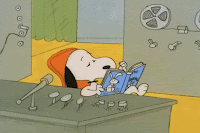Whoa! A relevant pop culture title. First one in ages!
Okay, there’s an issue that pops up at the Coffeehouse now and then. Someone sent me a message about it on Facebook a week or three back, too. And it’s something I’ve kinda had in the back of my mind to mention again.
It takes a couple different forms, but what this usually boils down to is keeping enthusiasm up for writing.
It’s always fun to start a new project, but then they almost always boil down to… well, work.
And when we think of writing, people don’t like to think about work.
They want passion and muses and wild nights of drunken creativity when the words flow at a rate of two thousand an hour or more.

But the ugly truth is… it’s often work.
A lot of work.
Suddenly all that excitement of that first step is gone and enthusiasm begins to ebb.
We’re not exactly sure what we’re supposed to do next. And we’re only on chapter four!
So here are a few things I can do to make that first draft a little easier
–Know where I’m going
Yeah, sure, there’s something wonderful and romantic about saying “wow, I just learned how to drive this weekend—it’s time to explore America’s highways!!” Just jumping behind the wheel and taking off. No destination, no maps, nothing. Just me and my best woman/man/dog in the passenger seat. We’ll figure it out as we go!
Again… sounds wonderful and romantic, but I think we can all guess how a trip like that will really turn out.
If I’m going to write a book, I should start off with a really rough idea of how it’s going to end.
I don’t need to stick to that ending, but it’s tough to keep moving forward when I don’t know what direction forward is.
So even just a very general endpoint—“Wakko and Dot sell their invention and get rich.”
“Yakko uses his giant Mechbot to stop the aliens”
“Phoebe’s
the only one who gets out alive.”—will give me something to aim for.
–Schedule the time
Okay, I admit… this can be a tough one. I’m in a lucky position when it comes to writing. It’s my full-time job, and I make a living at it. I do it from home. I don’t have kids. My girlfriend’s a writer, too, so she needs her own time just as much as I need mine. Most people aren’t in this position.

But y’know what?
I wasn’t always, either. I had a full-time journalism job while I wrote
Ex-Heroes and
Ex-Patriotsand my
Crusoe mash-up novel. And I haven’t always been in such writer-friendly relationships.
Heck, I’ll be honest. There were a few romantic relationships in my past where me announcing “I want to write for a while” got a bit of a… negative reaction.
There were rolled eyes, some gentle mocking, even a bit of resentment. And being a younger man who wanted to preserve
certain day-to-day aspects of these relationships… I put my writing aside. It was ultimately my choice, and that was the choice I made.
Which is why I didn’t have much writing success in my twenties—writing was a very low priority that I was willing to ignore for other things.
There’s always going to be other things, so I need to make time for myself to write. An hour before bed, on the train into work, or a big block on the weekend. Just like exercise or learning the violin or finally watching Downton Abbey, writing’s something that’s easy to put off. It can very quickly become the thing I’ll do nextweekend. So I need to figure out a time and try to stick to it.
–Don’t starve myself
I know some folks try not to read similar things while they’re working on a project because they don’t want to be influenced.
I think sometimes this leaks out and becomes one of those
telephone-game pieces of advice where new writers end up thinking they shouldn’t read anything while they’re writing.
Or watch anything. or listen to anything.
Or talk to other writers.
Or…
We need input. That’s just common sense.
No input, no output.
I can’t expect to build a lot of muscle if I’m not eating anything.
Also—and this is, again, just my own opinion—this kind of “starvation” approach can easily turn writing into some sort of punishment. I’d like to hang with my girlfriend or read a comic or watch the finale of Rebels…but I didn’t write today so I get nothing! If my method makes me hate writing… maybe I don’t have the best method.
But again, don’t use feeding appetites as an excuse to put off writing until next weekend. Don’t fall for the same traps twenty-something year old me did! Learn from my mistakes!
–Know what I know

This is also a good time for me to toss out my usual comments about
voice and
spelling and drafts.
It’s important to learn and develop these things, because it’s easy to lose momentum when I end up second-guessing myself a lot.
If I stop to double-check every four-syllable word or verb tense or read each line of dialogue out loud… it’s going to be easy to lose enthusiasm.
Don’t forget that none of this matters in a first draft.
It’s definitely going to matter—just not right now.
First drafts are
big, messy, gap-filled things.
They’re not the point where I should be worried about little stuff. For now, just plow ahead. I’ll get to deal with all that stuff soon enough.
–Just do it
I know this sounds like crap advice, but sometimes the way to keep writing is just, well… to keep writing.
At the end of the day, sometimes that’s what it comes down to.
I can keep making excuses, let myself get distracted, promise myself to do it later.
Or I can just do it.
Or maybe ask myself why I keep not doing it.
So there you go. A few easy ways to keep yourself on track. If you’ve got a favorite of your own, feel free to add it below.
Anyway… hopefully, next week’s rant will be better than this one.
Until then, go write.
 The Micro and Macro– This is one of the ones were it’s especially important to have a really good sense of my readers. When it comes to criticism, any book is going to have two aspects to it. There’s the big picture stuff—did you like it? Did the twist make sense? Was Wakko’s overall motivation believable? Then there’s the smaller stuff—does this line of dialogue work? Does this description stand out? Is this action too detailed?
The Micro and Macro– This is one of the ones were it’s especially important to have a really good sense of my readers. When it comes to criticism, any book is going to have two aspects to it. There’s the big picture stuff—did you like it? Did the twist make sense? Was Wakko’s overall motivation believable? Then there’s the smaller stuff—does this line of dialogue work? Does this description stand out? Is this action too detailed?
 I need to trust my beta readers. If I’ve got any doubts about their abilities, their motives, or their work ethic… I probably shouldn’t ask them to read this. If I’m going to ignore what they tell me, or tell myself they just didn’t get it… I probably shouldn’t ask them to read this. We need to be open to the criticism we’re going to get, and we have to trust the people giving it to us.
I need to trust my beta readers. If I’ve got any doubts about their abilities, their motives, or their work ethic… I probably shouldn’t ask them to read this. If I’m going to ignore what they tell me, or tell myself they just didn’t get it… I probably shouldn’t ask them to read this. We need to be open to the criticism we’re going to get, and we have to trust the people giving it to us.






